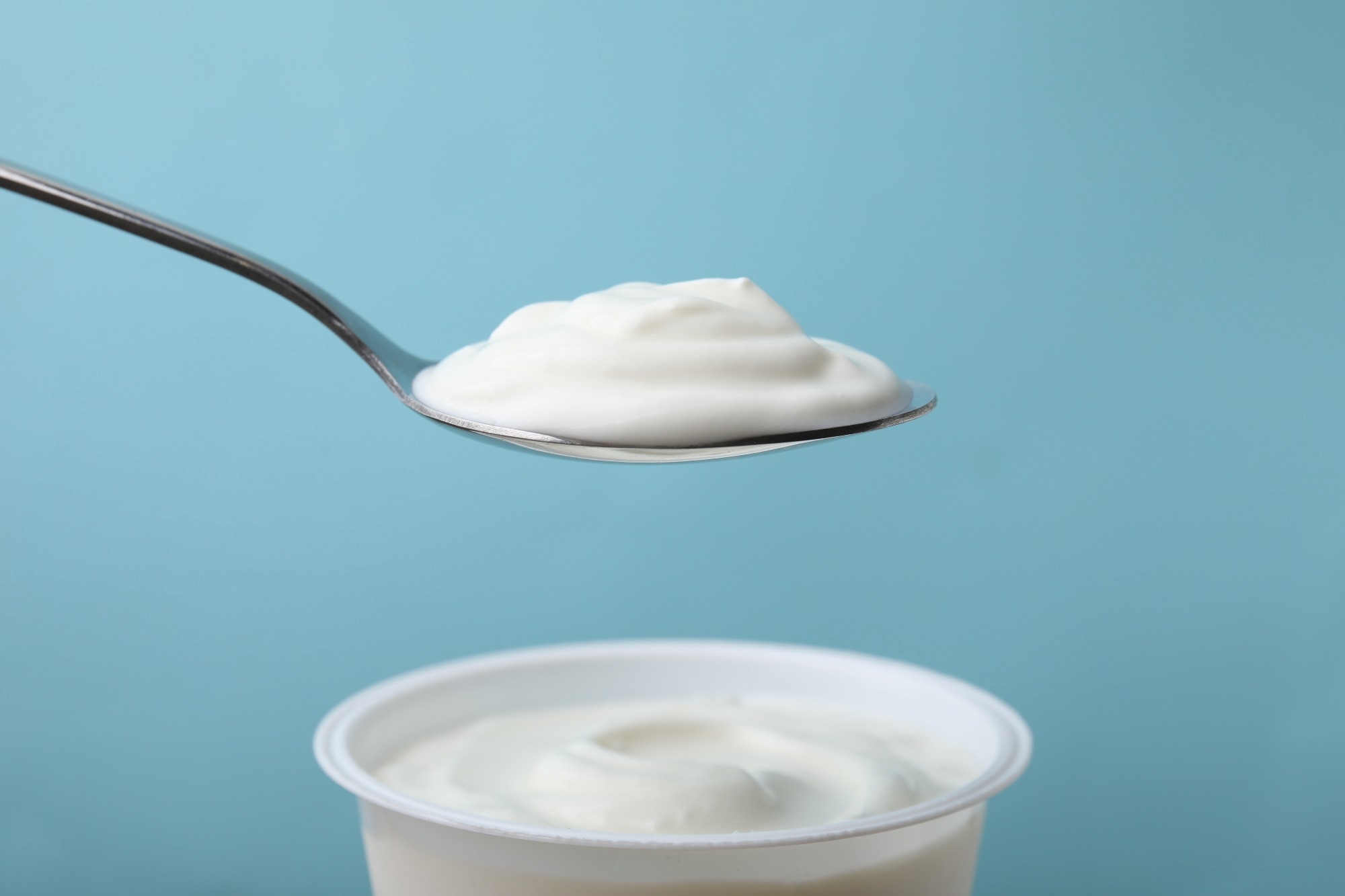Despite its rich nutrients and probiotics, yogurt shows little impact on fracture prevention or bone strength, highlighting the need for stronger clinical trials before it can be recommended as a bone-health booster.
 Study: Impact of yogurt consumption on bone health markers in adults with or without osteoporosis: a systematic review and meta-analysis. Image Credit: New Africa / Shutterstock.com
Study: Impact of yogurt consumption on bone health markers in adults with or without osteoporosis: a systematic review and meta-analysis. Image Credit: New Africa / Shutterstock.com
Yogurt is a fermented dairy product with high nutritional value and multiple health benefits; however, its impact on bone health remains unclear. A recent study published in Frontiers in Nutrition reviews the impact of yogurt consumption on bone health in healthy adults.
The science of yogurt
The fermentation of yogurt relies on the symbiotic interaction between Streptococcus thermophilus (S. thermophilus) and Lactobacillus delbrueckii subsp. bulgaricus (L. bulgaricus). The coordinated metabolic interaction between these bacteria converts lactose, the sugar present in milk, into lactic acid, which leads to the characteristic thickness and tangy flavor of yogurt products.
S. thermophilus and L. bulgaricus provide specific health benefits to yogurt consumers, as they synthesize vitamins B and K, in addition to producing bioactive compounds such as lactic acid and γ-aminobutyric acid (GABA) during fermentation. Yogurt may also influence the composition of the gut microbiota, as these bacteria break down milk proteins into anti-inflammatory bioactive compounds that support gut barrier health and function.
Yogurt is an excellent source of calcium, potassium, magnesium, phosphorus, zinc, and selenium, with a higher proportion of these minerals ionized and bioavailable as compared to their properties in milk. Yogurt also supplies high quality protein that yields anti-inflammatory short-chain fatty acids, which similarly contribute to reduced bone resorption.
Bones are primarily formed during childhood and adolescence, after which bone remodeling and repair predominates. By 30 years of age, bone resorption increases while less new bone is formed, which eventually leads to slow attrition of bone mass, thereby increasing the risk of fractures due to osteopenia or osteoporosis.
Previous studies demonstrate that yogurt can increase lactose digestion, reduce the risk of type 2 diabetes, promote metabolic health and immunotolerance, as well as improve mental health and bone health. Vitamins D, B and K are also essential for maintaining optimal bone health.
About the study
The researchers of the current study performed a systematic review of 12 observational studies examining the effect of yogurt, rather than just milk or dairy products, on bone health in adults with and without osteoporosis. Bone health was based on bone mineral density (BMD), fracture risk, and markers of bone turnover. The review could not establish causality because no randomized controlled trials were identified.
Reasons for study rejection included incorrect population attributes, fermented products, or additives, including prebiotics and postbiotics. Notably, the use of S. thermophilus and L. bulgaricus as prebiotics also led to their removal from the study. Interventions with yoghurt enriched with additional probiotics, vitamin D, or other bioactive compounds were also excluded to ensure only traditional yoghurt was assessed.
Other exclusion criteria included studies that did not provide pre-defined outcomes, did not have a control group, as well as those with a short follow-up period of six months or less. Studies that did not accurately detect changes in BMD or fracture risk, as well as those that lacked specific bone health end points, were also excluded from the final analysis.
Study findings
Two of the 12 studies included in the current review suggested a small protective effect of high yogurt consumption against osteoporosis and a positive effect on BMD; however, no protection against fracture was observed. Moreover, the meta-analysis of six cohort studies did not report that yogurt was associated with a reduced risk of hip fracture or increased BMD. Although the pooled analysis showed a statistically significant effect on BMD, the effect size was extremely small (SMD = 0.009) and considered clinically negligible.
None of the reviewed studies quantified bacterial counts of the yogurt used or their viability, both of which are crucial metrics that reflect the functional properties. Another factor that may influence outcomes is that none of the included studies measured baseline vitamin D and calcium status of the study participants, which further introduces biological heterogeneity into the analysis.
Several studies have established that the numerous individual dietary constituents present within yogurt confer notable health benefits. Notably, the fermentation process that produces yogurt, the increased bioavailability of these nutrients, and their effects on the gut microbiome may confer additional health benefits. The review emphasized that yoghurt contains vitamin K2, which plays a key role in bone mineralization, and that variation in starter cultures and fat content may affect nutrient composition. Alterations of the gut microbiota and production of short-chain fatty acids also suggest potential gut-bone axis effects, though they remain difficult to quantify.
The studies limited the characterization of yoghurt; details such as fat content, fortification, and whether probiotic strains beyond the traditional starter were included were rarely reported. ~This lack of product characterization further contradicts the findings.
Yogurt does not provide convincing benefits in fracture prevention, and its impact on BMD is, at best, marginal.
Conclusions
The current review suggests that yogurt does not directly reduce fracture risk or increase BMD in adults. Nevertheless, well-designed randomized controlled trials that accurately characterize the ingredients, bioactive components, and probiotic strains of yogurt should be conducted to confirm the association between this dairy product and bone health.
Until then, yoghurt may still be valuable as part of a balanced diet, but its effectiveness as a primary strategy for bone health remains unsubstantiated.
Journal reference:
- Mayo, B., Malagon-Rojas, J., Agahi, F., et al. (2025). Impact of yogurt consumption on bone health markers in adults with or without osteoporosis: a systematic review and meta-analysis. Frontiers in Nutrition. doi:10.3389/fnut.2025.1660505.